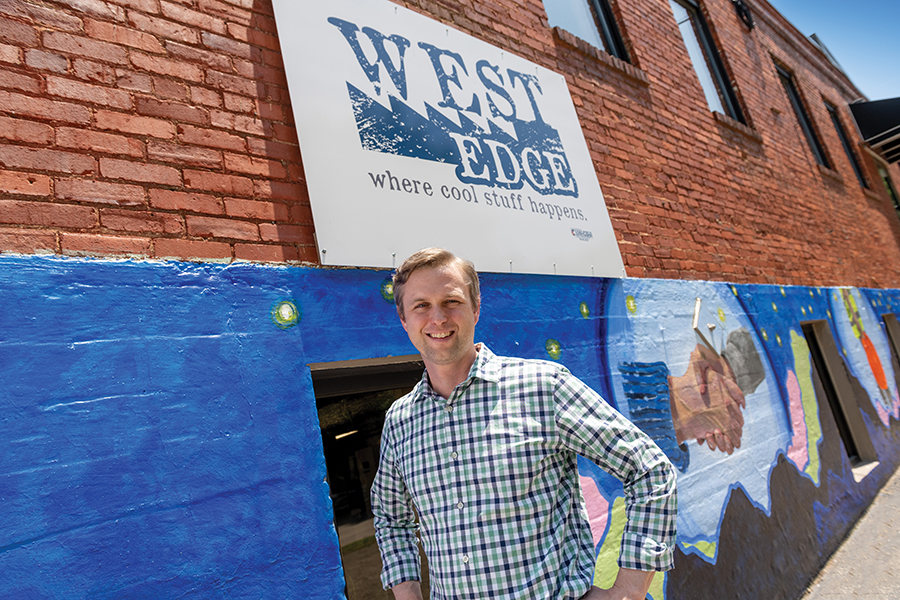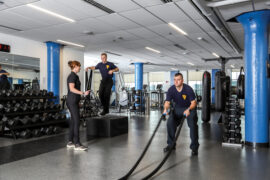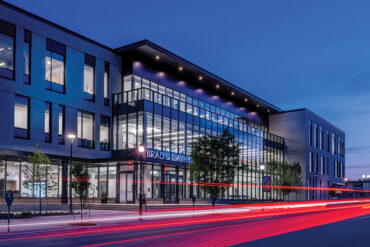Coalfield Development founder Brandon Dennison transformed the old Corbin factory into an innovative economic development hub. Today he is working with Marshall to build a bold new economy for Appalachia.
By Katherine Pyles
HQ 122 | SUMMER 2023
Working at a clothing factory requires a certain rigidity. Doing things by the book, sticking to the proven formula — on an assembly line, these are the benchmarks of excellence. And for over 60 years at the Corbin factory in Westmoreland, these were the standards that defined success. The massive brick building on Vernon Street stood as a testament to quality and consistency until Corbin, unable to keep up with the rapidly changing retail sector, closed the plant for good in 2002.
For a little over 10 years, the factory sat vacant. Hoping to cut demolition costs, the Wayne County Economic Development Authority brought in a small nonprofit startup called Coalfield Development Corporation to salvage materials from the building. Coalfield had earned a reputation for its workforce training program for displaced coal miners and other unemployed people, providing on-the-job training in emerging industries like solar energy, environmentally sensitive construction and sustainable agriculture. At the time the program was limited to construction and deconstruction, and Coalfield’s crews were often hired to reclaim materials from dilapidated buildings for reuse in woodworking and other trades.
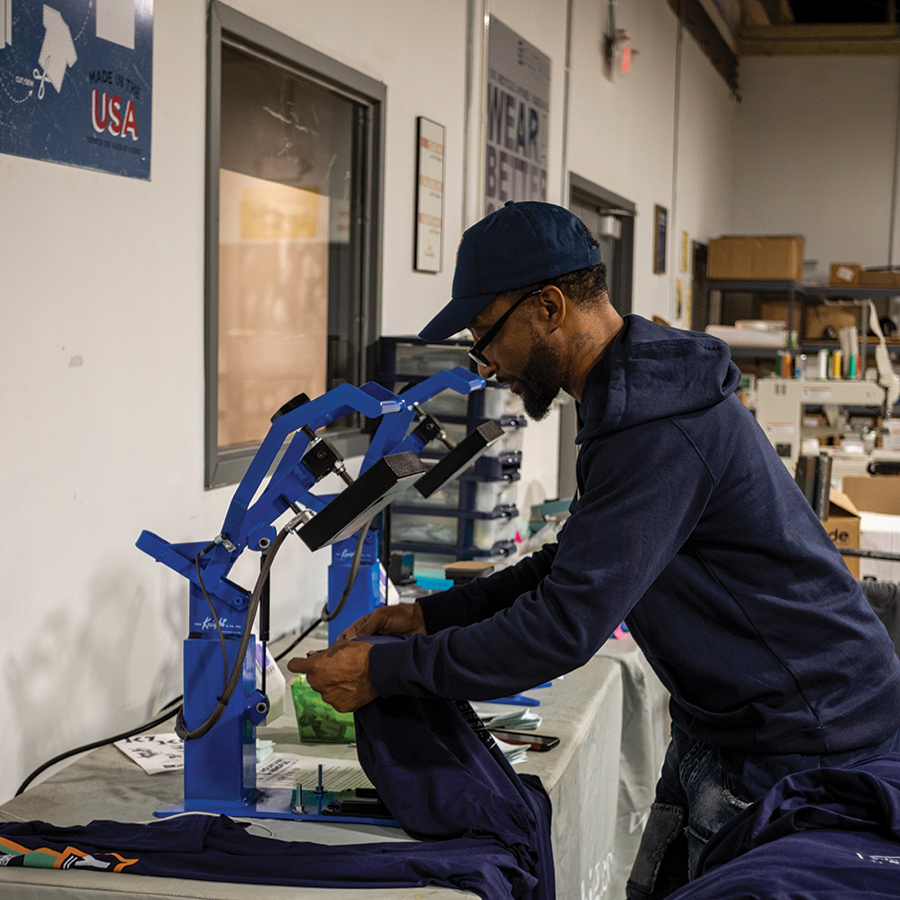
But the little nonprofit had a big vision for the abandoned property.
“The more we were in the building, the more we fell in love with it,” said Executive President Brandon Dennison, who founded Coalfield Development Corporation in 2010. “This factory had beautiful architecture. It had character and soul that a new shell building could never have. It clearly had stories. During community conversations, many people said, ‘You’re going to have to tear it down. It’s too far gone.’ We refused to see it that way.”
Out of those conversations, a vision emerged for a “hub for creativity,” he said, a center for job training, personal development and creative growth that would draw on the building’s history of industry and craft. Restored, repurposed and rebranded as the West Edge Factory in 2014, the space is now home to several of Coalfield’s social enterprises: Mountain Mindful, which makes clothing, furniture and self-care products out of reclaimed, recycled and organic materials; Refresh Appalachia, a sustainable agriculture co-op; and Turret Studios, an art gallery and studio space for local artists. West Edge’s event space, Front 14, is rented out for proms, weddings, corporate events and more. The Black Box Theater, a 200-seat entertainment venue, will open soon.
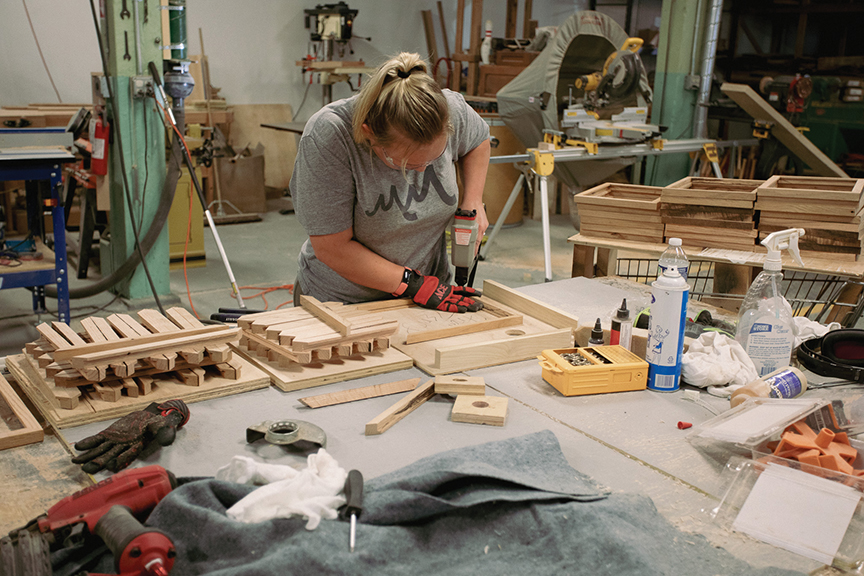
A new way of thinking defines success at the factory today.
“In many ways, West Edge Factory is the story of southern West Virginia,” Dennison said. “We used to make things here. We’ve had hard times. But we’re on the comeback trail. People work here, people learn here, people train here — and people are building a new Appalachian economy here.”
Centered on the concept of social enterprise, Coalfield addresses the region’s economic downturn in the wake of the coal industry’s collapse by not only training workers in new industries but also creating sustainable businesses that allow the workers to put their new skills and credentials to use. Since 2010, Coalfield has trained over 2,000 people in new economic sectors, supported 72 new businesses and created over 700 new jobs.

It sounds like a lot of “new.” But according to Dennison, Coalfield is just working with what’s been here all along. He said the qualities that helped our Appalachian ancestors survive and that powered our nation’s growth by coal — ingenuity, self-reliance, honor, dignity, a connection to the land around us — are the same qualities needed to build a new Appalachian economy today.
“Coalfield Development is not about changing Appalachia into something that we’re not,” he said. “It’s about helping us find our true selves — and having a full life in the process. It’s about honoring the character and soul of our communities and our people.”
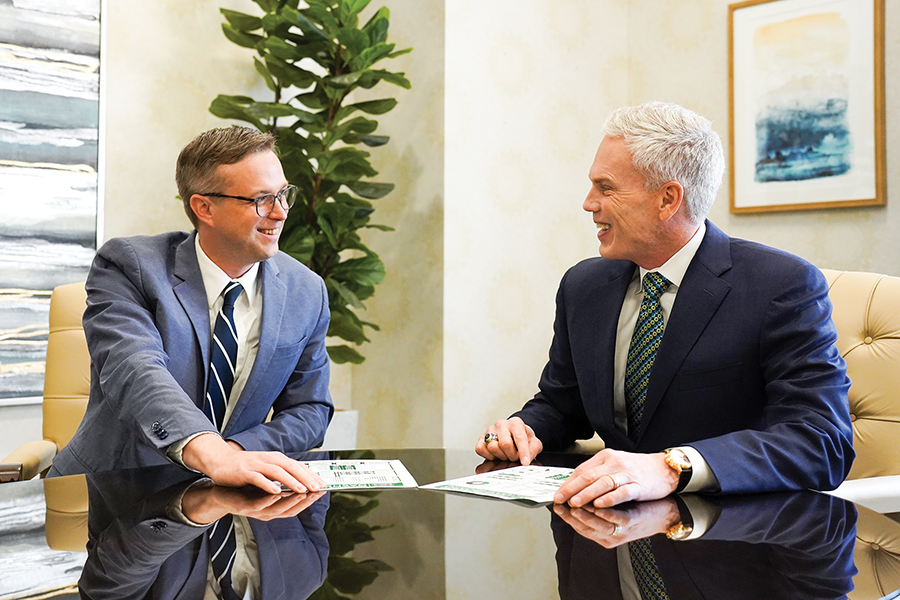
The idea for Coalfield arose when Dennison, a college student on a church mission trip to Williamson, West Virginia, was approached by two young men with toolbelts, asking if he had any work for them.
“I’d always had a passion for West Virginia and a strong sense that we were capable of so much more, but I really didn’t know what to do with it until that moment,” he said. “We had young people literally wandering the streets with toolbelts looking for a little bit of work. We also had this huge problem of dilapidated, abandoned buildings. I thought, ‘Could we hire these young people to tear these buildings apart? And then, instead of dumping the materials in a landfill, could we reuse them, or even resell them?’”
Dennison’s close friend Chase Thomas, who still serves on Coalfield’s board, left a successful job to get his contractor’s license with Dennison. And Coalfield Development Corporation was born.
“Around 2015 was when the bottom really fell out of the coal industry,” Dennison said, reflecting on the organization’s breakout success. “Natural gas got really cheap, renewables began a rapid expansion and regulations became tighter than they’d ever been. That created the perfect storm for economic calamity in southern West Virginia. Coalfield was one of the few folks around who had a solution.”
Coalfield created a workforce development model called the 33-6-3 model, which offers workers a two-and-a-half-year contract that includes 33 hours per week of paid work, six credit hours of higher education and three hours of personal development mentorship. They graduate from the program with an associate’s degree or other certification that they can take with them anywhere. It’s groundbreaking, and it works.
“We were seeing really transformative results from the beginning,” Dennison said. “Everywhere I shared the model, it just seemed to click. We’re not a silver bullet; we’re not the only solution — but what we do works really well for the people we serve.”
Thirteen years later, the organization’s influence continues to widen. Coalfield heads up the ACT (Appalachian Climate Technologies) Now Coalition, an unprecedented collaboration between West Virginia cities, economic revitalization organizations, academic institutions and private sector innovators.
The coalition is working together to create “green-collar” jobs in social enterprise, expand local tech businesses, redevelop environmentally unsafe brownfields for clean technology uses and reclaim mine land for reuse in sectors like agroforestry, ecotourism and renewable energy. At the press conference announcing the coalition’s launch, Dennison introduced Huntington Mayor Steve Williams, who handed the microphone over to Charleston Mayor Amy Goodwin. Later, Marshall President Brad Smith passed the mic to WVU President Gordon Gee. It was a powerful display of unity, Dennison said.
“I still get chills thinking about that day,” he said. “People usually come together like that to fight something, but we came together with a vision for the future — a creative, proactive vision for a new economy in our region. Being a founding member of the ACT Now Coalition is an absolute highlight of my career and life.”

Williams, who’s been imploring Huntington to “make no little plans” since his election as mayor in 2012, said Dennison and the other coalition members are the right people at the right time to move the region forward.
“If there’s anybody who’s prepared to step forward on this, it’s us — and it’s largely because of Brandon’s tireless efforts,” Williams said. “Huntington was founded in 1871 as an outgrowth of the Industrial Revolution, and it’s time we stepped out of the Industrial Revolution and into the Digital Age. This concept of social enterprise — this triple bottom line of people, planet and profit — is how we do that. The work Brandon is doing, both at Coalfield Development and with the ACT Now Coalition, is how we do that.”
Smith, with whom Dennison has worked closely on several entrepreneurial projects at Marshall, described Dennison as “a forward-thinker who builds bridges and connections among people.” Dennison began his service at Marshall as an entrepreneur-in-residence at the university’s iCenter, where he mentored students interested in social enterprise. In June 2023, he was named Marshall’s vice president for workforce and economic development. He now oversees a team that includes Marshall’s Advanced Manufacturing Center; the Southern WV Brownfields Center; the Center for Environmental, Geotechnical, and Applied Sciences; Marshall’s Sustainability Department; and the Alliance for the Economic Development of Southern West Virginia.
“We are excited to have someone with Brandon’s vision and leadership to help us further grow our collective impact,” said Smith, whose goal is to position Marshall as a “prosperity platform” for West Virginia and beyond. “As a nationally renowned social enterprise expert and a son of southern West Virginia, he brings his unparalleled passion, intense energy and knowledge of Appalachia to this post.”
Dennison will remain Coalfield’s executive president and continue to guide the organization’s long-term strategy. He said his new areas of focus at Marshall build off the work he’s been doing at Coalfield for the past 13 years.
“I’m proud to join this team and be a part of the ‘We Are’ movement Brad is leading,” Dennison said.
“Marshall is the key asset to this region’s economic future. Over the past decade of my work in southern West Virginia, I have seen time and again how Marshall serves as the gateway to opportunity for students from some of the most distressed counties in our region. As a region we have to do everything we can to support and cultivate entrepreneurs, and to make it possible for young people to be able to stay here and thrive.”
Smith said what sets Dennison apart is that he views success in a way that can’t help but bring others along.
“Brandon’s amazing spirit is awe-inspiring, and people gravitate toward him,” Smith said. “He is the ultimate example of an innovator who creates with his head and his heart. It’s not enough for him to be personally effective — his success must align with the success of his community.”
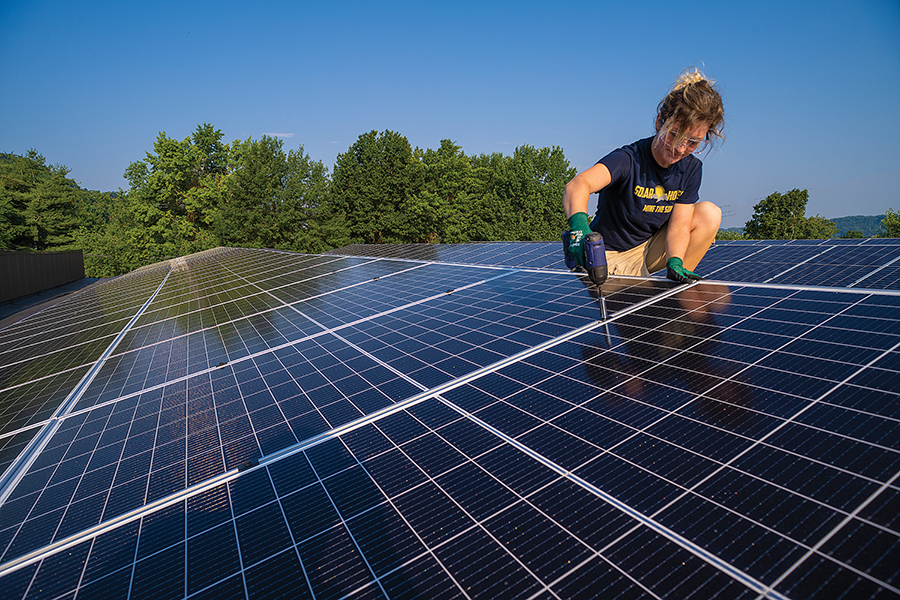
Dennison’s visionary thinking has garnered international attention and numerous awards. He’s been recognized by media outlets ranging from CNN to The Wall Street Journal to BBC News. Forbes Magazine described his work as “a model for collective action and public investment in the years ahead.”
Dennison was named Business Innovator of the Year by The Herald-Dispatch in 2021 and West Virginian of the Year by WV Living in 2017. He’s a winner of the JMK Social Innovation Prize, a DRK Entrepreneur and an Ashoka Fellow. Earlier this year, he participated in a roundtable discussion at the White House on revitalizing the country’s coal communities.
But to Dennison, a sixth-generation West Virginian, there’s no place like home. He and his wife Ashley, a yoga instructor at Studio 8, live in Huntington with their two sons, Owen, 6, and Will, 4. On the weekends, you’ll likely find them at Heritage Farm when the weather’s nice and the Huntington Museum of Art when it’s not. They have recently taken up yoga as a family — “Owen especially loves it,” Dennison said — and enjoy hiking at Beech Fork.
“The boys are at a really fun age,” Dennison said. “Seeing the world through their eyes — watching them soak it all in and learn new things every single day, every single minute — is a joy.”
Noticeably, the family’s favorite pastimes are all close to home. Their appreciation for the opportunities around them reflects Dennison’s belief that in West Virginia, we have all we need.
“I’m not motivated by being the biggest or the best; I’m not trying to build an ‘economic empire,’” Dennison said. “I just want to have a full life. I want my wife and kids and family and community to have a full life.”

